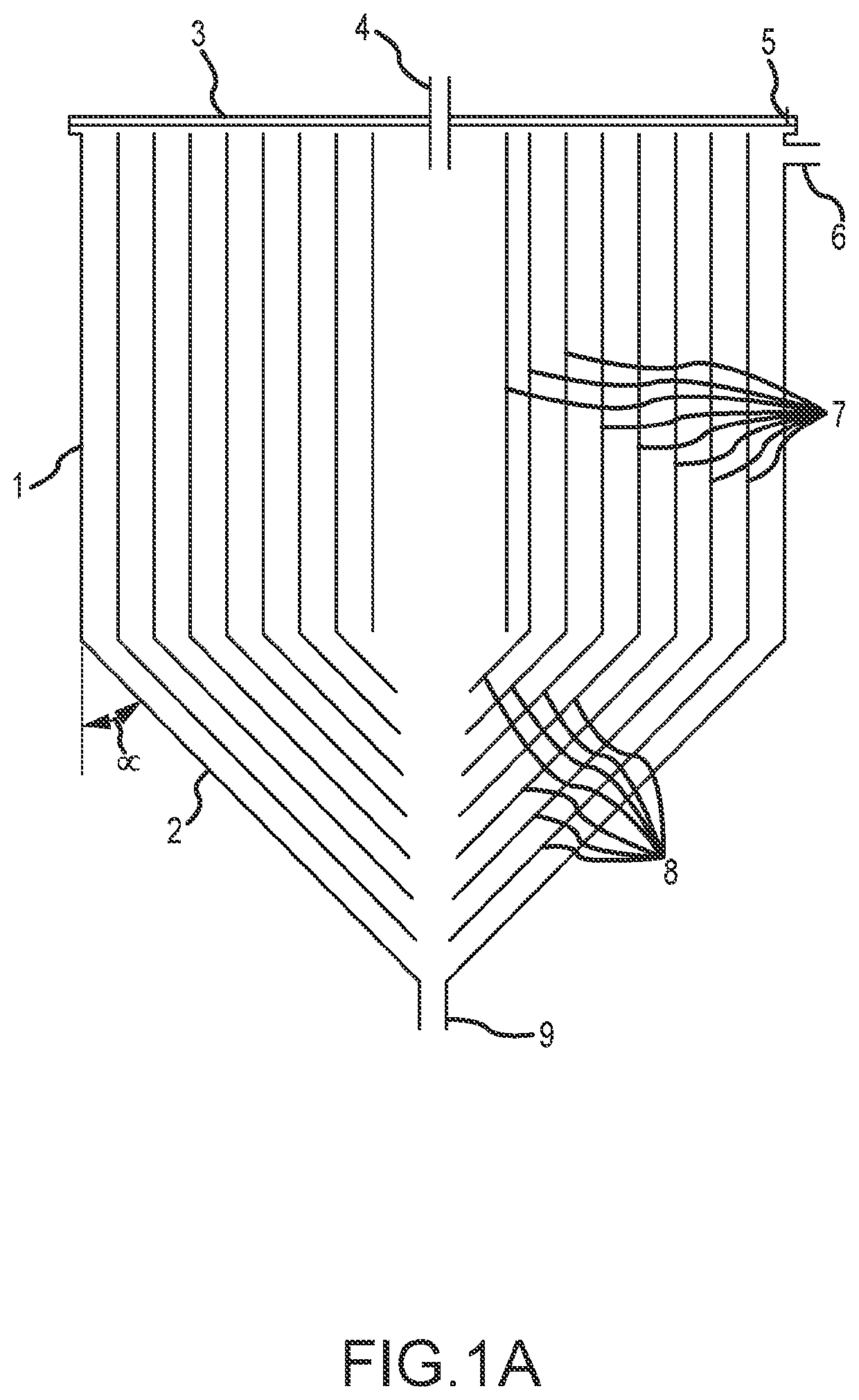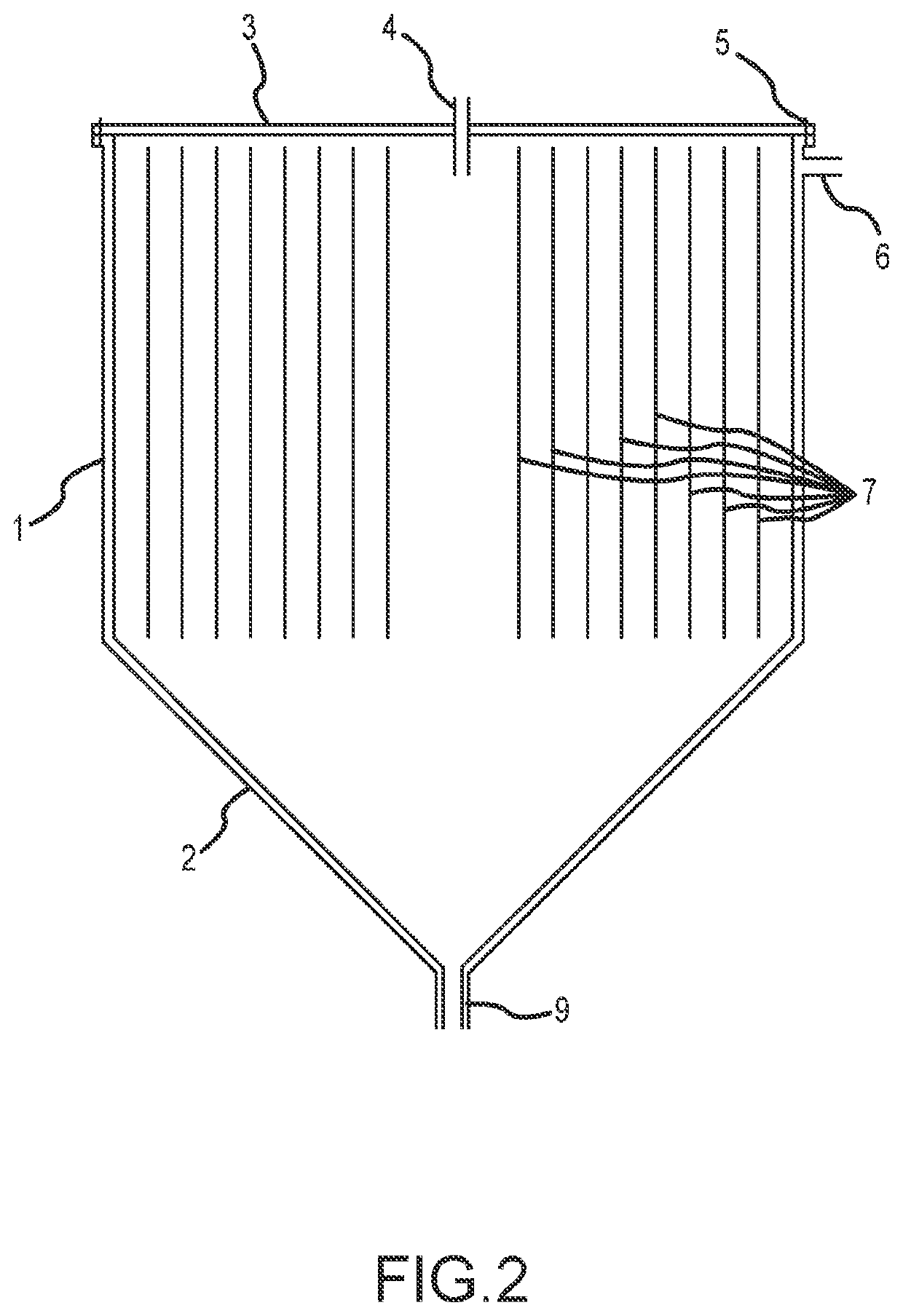Particle settling devices
a technology of particle settling and settling device, which is applied in the direction of vortex flow apparatus, peptides, water treatment, etc., can solve the problems of inability to produce enough centrifugal force, inability to separate dead cells from live cells desired in bioreactors, and serious damage to mammalian cells at higher flow rates. , to achieve the effect of enhancing the settling efficiency of particles
- Summary
- Abstract
- Description
- Claims
- Application Information
AI Technical Summary
Benefits of technology
Problems solved by technology
Method used
Image
Examples
example 1
Other Microbial Cells Secreting Protein Products
[0207]Recombinant microbial cells, such as yeast or fungal (Pichia pastoris, Saccharomyces cerevisiae, Kluyveromyces lactis, Aspergillus niger, etc.) or bacterial (Escherichia coli, Bacillus subtilis, etc.) cells, which have been engineered to secrete heterologous proteins (for example, insulin or brazzein) or naturally secreting enzymes (e.g. A. niger, B. subtilis, etc.) can be grown in bioreactors attached to the compact settler device of this disclosure, to recycle live and productive cells back to the bioreactor, which will thereby achieve high cell densities and high productivities. Fresh nutrient media is continuously supplied to the live and productive cells inside the high cell density bioreactors and the secreted proteins or enzymes are continuously harvested in the clarified outlet from the top port (or top-side outlets as shown in FIGS. 5, 6 and 7), while the concentrated live and productive cells are returned back to the bi...
example 2
Yeast Cells from Beer
[0215]In large-scale brewing operations, yeast cells are removed from the product beer by filtration devices, which regularly get clogged, or centrifugation devices, which are expensive high-speed mechanical devices. Previously, hydrocyclones were unsuccessfully tested for this application (Yuan et al., 1996; Cilliers and Harrison, 1997). These devices can be readily replaced by the settler devices of this disclosure to clarify beer from the top outlets and remove the concentrated yeast cell suspension from the bottom outlet. Due to the increased residence time and enhanced sedimentation in the conical settler zones of this disclosure, the inventor has achieved successful separation of yeast cells from cell culture liquid, harvesting the culture supernatant containing only about 5% of the cells entering the settler device in its first operation. As the device can be scaled up or down to increase or decrease its cell separation efficiency, it is feasible to obtai...
example 3
[0216]Enhanced sedimentation of murine hybridoma and recombinant mammalian cells in inclined settlers have already been demonstrated successfully (Batt et al., 1990 and Searles et al., 1994) and scaled up in lamellar settlers (Thompson and Wilson, U.S. Pat. No. 5,817,505, 1998). While the lamellar settlers are scaled up in three dimensions independently, a conical settler device of this disclosure can be scaled up in three dimensions simultaneously by simply increasing its radius, as discussed above. Thus, the settlers of this disclosure are more compact, contain much more inclined surfaces for settling on a smaller footprint, and are more easily scalable cell retention devices with proven applications in mammalian cell cultures secreting glycoproteins, such as monoclonal antibodies, and other therapeutic proteins. The clarified harvest output from the top port containing the secreted protein is harvested continuously from the cell retention device, while the ...
PUM
| Property | Measurement | Unit |
|---|---|---|
| productivity | aaaaa | aaaaa |
| angle | aaaaa | aaaaa |
| horizontal spacing | aaaaa | aaaaa |
Abstract
Description
Claims
Application Information
 Login to View More
Login to View More - R&D
- Intellectual Property
- Life Sciences
- Materials
- Tech Scout
- Unparalleled Data Quality
- Higher Quality Content
- 60% Fewer Hallucinations
Browse by: Latest US Patents, China's latest patents, Technical Efficacy Thesaurus, Application Domain, Technology Topic, Popular Technical Reports.
© 2025 PatSnap. All rights reserved.Legal|Privacy policy|Modern Slavery Act Transparency Statement|Sitemap|About US| Contact US: help@patsnap.com



